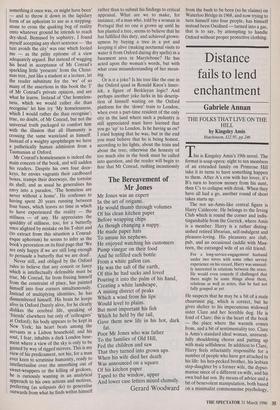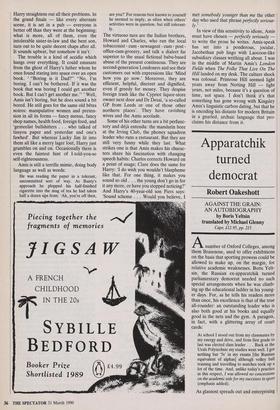Distance fails to lend enchantment
Gabriele Annan
THE FOLKS THAT LIVE ON THE HILL by Kingsley Amis Hutchinson, £12.95, pp.246 This is Kingsley Amis's'19th novel. The format is soap opera: eight to ten members of an extended family on Primrose Hill take it in turns to have something happen to them. After A's row with her lover, it's B's turn to borrow money from his aunt, then C's to collapse with drink. When they have all had a go, another round of short takes starts up.
The not un-Arnis-like central figure is Harry Caldecote. He belongs to the Irving Club which is round the corner and indis- tinguishable from the Garrick, where Amis is a member. Harry is a rather disting- uished retired librarian, self-indulgent and pleasure-loving. His pleasures are club, pub, and an occasional cuddle with Mau- reen, the estranged wife of an old friend.
For a long-service-engagement husband under two wives with some other service experience on his record, Harry was unusual- ly interested in relations between the sexes. He would even concede if challenged that there might be some things about them, relations as well as sexes, that he had not fully grasped as yet.
He suspects that he may be a bit of a male chauvinist pig, which is correct, but he gives shelter to his impecunious widowed sister Clare and her horrible dog. He is fond of Clare; this is the heart of the book — the place where the warmth comes from, and a bit of sentimentality too. Clare is Amis's standard ideal woman, unresent- fully shouldering chores and putting up with male selfishness. In addition to Clare, Harry feels reluctantly responsible for a number of people who have got attached to his life: his hen-pecked brother, his lesbian step-daughter by a former wife, the dypso- maniac niece of a different ex-wife, and his own bad-hat son. By means of advice and a bit of benevolent manipulation, both based on a minimalist commonsense psychology, Harry straightens out all their problems. In the grand finale — like every alternate scene, it is set in a pub — everyone is better off than they were at the beginning; what is more, all of them, even the intolerable sister-in-law and the bent son, turn out to be quite decent chaps after all. It sounds upbeat, but somehow it isn't.
The trouble is a kind of accidie which hangs over everything. It could emanate from the ghost of Harry's father whom he once found staring into space over an open book. ` "Boring is it Dad?" "No, I'm boring. I can't be bothered. If it was the book that was boring I could get another book. But I can't get another me." ' Well, Amis isn't boring, but he does sound a bit bored. He still goes for the same old bêtes noires: manipulative women and preten- sion in all its forms — fancy menus, fancy shop names, health food, foreign food, and `genteelist bullshitters . . . who talked of tissyou paper and yesterdae and one's fawhed'. But whereas Lucky Jim lit into them all like a merry lager lout, Harry just grumbles on and on. Occasionally there is even the faintest hint of I-told-you-so self-righteousness.
Amis is still a terrific mimic, doing body language as well as words:
He was reading the paper in a tolerant,. uncommitted sort of way. At Bunty's approach he plopped his half-finished cigarette into the mug of tea he had taken half a dozen sips from: `Ah, you're off then, are you?' For reasons best known to yourself he seemed to imply, as often when others' activities were in question, but still tolerant- ly.
The virtuoso turn are the Indian brothers, Howard and Charles, who run the local tobacconist - cum - newsagent - cum - post office-cum-grocery, and talk a dialect far superior to the usual fictional babu-based abuse of the present continuous. They are second-generation Londoners and see their customers out with expressions like 'Mind how you go now.' Moreover, they are efficient, helpful, discreet and dignified, even if greedy for money. They despise foreign trash like the Cypriot liquor-store owner next door and Dr Desai, so-called GP from Leeds or one of those other northern places'. They have ravishing wives and the Amis accolade.
Some of his other turns are a bit perfunc- tory and déjà entendu: the mandarin bore at the Irving Club, the phoney squadron leader who runs a restaurant. But they are still very funny while they last. What strikes one is that Amis makes his charac- ters share his fascination with changing speech habits: Charles corrects Howard on a point of usage; Clare does the same for Harry: `I do wish you wouldn't blaspheme like that. For one thing, it makes you sound so old . . . the young don't go in for it any more, or have you stopped noticing?' And Harry's 40-year-old son Piers says: `Sound scheme . . . Would you believe, I met somebody younger than me the other day who used that phrase perfectly serious- ly.'
In view of this sensitivity to idiom, Amis must have chosen — perfectly seriously to write the prose he writes. Amis-speak has set into a ponderous, jocular, Jacobethan pub lingo with Laocoon-like subsidiary clauses writhing all about. I was in the middle of Martin Amis's London Fields when The Folks That Live On The Hill landed on my desk. The culture shock was colossal. Primrose Hill seemed light years away from Notting Hill — light years, not miles, because it's a question of time, not space. I don't think it's that something has gone wrong with Kingsley Amis's linguistic carbon dating, but that he is encoding his distaste for modern Britain in a gnarled, archaic language that pro- claims his distance from it.



























































 Previous page
Previous page